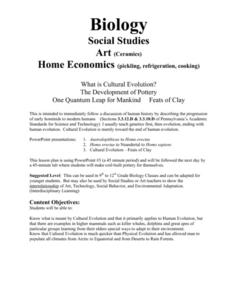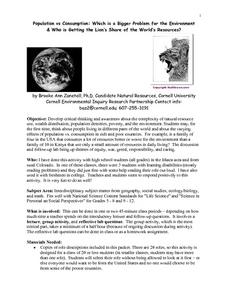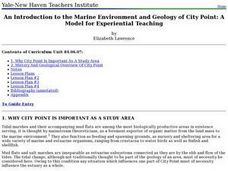Curated OER
Human Evolution: Biology, Bones
Learners will love a weeks worth of bone study. They use bones and characteristics of bones to explore the evolution of hominoids. Bones are compared, categorized, and considered. A great way to bring physical anthropology and material...
Kenan Fellows
Unit 4: The Brain
Drugs interact with the brain to alter moods, emotions, and behaviors by changing the brain's chemistry, perceptions, and interactions. The final lesson in the Pharmacology unit shows scholars experiments, has them complete four labs,...
Curated OER
Biological Relationships
Create a written document to show knowledge of producers, consumers, decomposers, and symbiotic relationships. To investigate food consumption, your classes will differentiate between types of symbiosis and explain examples of each.
Curated OER
Disease & Epidemics: Architects of History
Students explore disease and its relationship to history and literature. They investigate issues that range from early biological warfare and historical disease treatments, to observing today's race for the cure against current emerging...
National Geographic
Genetic Markers: Connecting the Dots
Biology buffs simulate how genetic markers are passed among populations in order to understand how these markers can help anthropologists map human migration. A couple of volunteers leave the room while you walk the remaining learners...
Core Knowledge Foundation
Genetics and the Master Race
How did the beginnings of genetic research influence the Nazi party? A thorough, engaging unit incorporates the work of Gregor Mendel, the study of inherited traits, and the use of racism and discrimination during the Holocaust.
Curated OER
Consider the Issues
High schoolers develop and express opinions on personal and societal issues in biology through journal entries (written and other forms), oral position statements and group discussions.
Curated OER
The Last Great Canal
Students read about a cholera outbreak in the 1840's. They read maps, predict how cholera moved throughout the country and participate in a lab activity that demonstrates how disease is spread. They compare cholera through time.
Curated OER
What is Cultural Evolution?
Students comprehend what is meant by Cultural Evolution and that it primarily applies at Human Evolution, but that there are examples in higher mammals such as a killer whales, dolphins and great apes of particular groups by exploring...
Curated OER
Pharmaceuticals and Treatments
Learners perform an experiment involving reverse transcriptase-polymerized chain reaction HIV replication to better examine the biotechnology used by scientists in pharmaceutical research of infections diseases like HIV. Students examine...
Curated OER
The Age of Reason and Enlightenment
A presentation that truly covers the age of reason and enlightenment. Nearly every facet, event, and key player in 18th Century Age of Enlightenment is covered. The information is clear, easy to follow, and lends itself well to note...
Curated OER
All in the Family
Students develop family genealogy charts in search of noticeable genetic relationships between relatives. They research their family and write a reflection on the genetic relationships between individuals on the chart.
Curated OER
A Summer Reading List for Science Teachers
Summer can be a time to read enjoyable books that can give you lesson ideas you can take back to the classroom.
Curated OER
Thumbs Up, Thumbs Down: Grasping the Idea of Evolution
Students compare and their performance of a series of tasks using their thumb and fingers to their performance of the same tasks without the use of their thumb. The class discussion that follows the activity defines and discusses the...
Curated OER
Population Vs Consumption: Which is a Bigger Problem for the Environment & Who is Getting the Lion's Share of the World's Resources?
Students develop critical thinking and awareness about the complexity of natural resource use, wealth distribution, population densities, poverty, and the environment. They think about people living in different parts of the world and...
Curated OER
Genetically Modified Foods
Students explain what genetically modified foods are and how they are created. Students use appropriate vocabulary to describe and effectively discuss the benefits of, and potential risks of, genetically modified foods.
Curated OER
An Introduction to the Marine Environment and Geology of City Point: A Model for Experiential Teaching
Students begin the lesson by researching the history of City Point, Connecticut. Using a map, they color areas they were asked to find and discuss why the areas are important to the community. As a class, they are shown recent slides...
Curated OER
Cave Painting in the Ice Age
Students take notes and sketch during the Internet research. They take notes of the colors found in the cave paintings (black, browns, ochre, sienna). They create an initial full size comprehensive sketch on scrap paper and in their...
Curated OER
Website Scavenger Hunt
Students use the internet to complete a species scavenger hunt. In groups, they answer questions given to them about sea lions, rockfish and killer whales. As a class, they identify any questions they have and discuss the role...
Curated OER
My Time - Lesson Plan
Middle schoolers discuss time, organize events like geologists do, become familiar with format of time scale used to organize information about Earth history, create list of 20 major events in their lifetimes, and add information about...
Other popular searches
- Biology Lab Photosynthesis
- Enzyme Biology Lab
- Biology Lab Microscopes
- Biology Lab Safety
- Biology Lab Skills
- Biology Lab Protocol
- Biology Lab Safety Lesson
- Biology Lab Energy
- Introduction to Biology Labs
- Biology Lab Skills Lesson
- Biology Lab Sskills
- Enzyme Biology Lab Pectinase





















